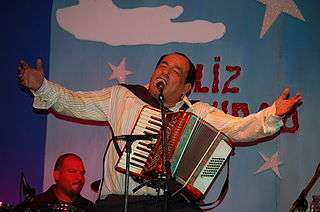Carlos Mejía Godoy

Carlos Mejía Godoy (born June 27, 1943) is a Nicaraguan musician, composer and singer. He was born in Somoto, Madriz. Son of Carlos Mejía Fajardo and María Elsa Godoy, his brother Luis Enrique Mejía Godoy, three years younger than he is, is also an acclaimed and much-loved musician. Carlos and Luis Enrique were pivotal in the New Song Movement in Central America beginning in the 1970s. They were both recently honored with Nicaragua's highest cultural distinction, the Order of Rubén Darío.
Carlos started his career as 'Corporito' on the radio station 'Radio Corporacion', where he would daily compose songs that would rain ridicule and scorn on all politicians and political parties. He would do it with that biting sense of humor that so few artists are able to master.
Many of his songs, performed with his band los de Palacagüina, became associated with the Sandinista movement as songs of the workers and revolutionaries. He even composed a Mass for the working class, the Misa Campesina Nicaragüense. Many of his songs during the late 1970s gave instructions on how to use, assemble, and disassemble the rifles people were capturing from dictator Somoza's National Guard during street battles.[1][2][3][4][5]
He was the vice-presidential running mate of Edmundo Jarquín of the Sandinista Renovation Movement (MRS) in the November 2006 presidential election. They came in fourth place.
Mejía Godoy is also the father of the United States Army conscientious objector and author Camilo Mejía.
Discography
- Albums
Some of his albums include: El Son Nuestro De Cada Día, La Nueva Milpa, Grandes Éxitos, and A Dos Puyas, No Hay Toro Valiente.
- Contributing artist
His music has also been featured on several compilations of songs of Nicaragua and the Nicaraguan revolution: Songs of the Nicaraguan Revolution, Vol.1-2, and Nicaraguita: Music from Nicaragua. He was also featured in The Rough Guide to the Music of Central America (2002, World Music Network).
Jefferson Starship recorded one of his songs for their 2008 album Jefferson's Tree of Liberty
References
- ↑ "Guitarra Armada". Guitarra Armada. archive.org. Retrieved 6 September 2010.
- ↑ Belli, Gioconda (2002). The Country Under My Skin. Alfred A. Knopf. p. 229. ISBN 978-0-375-40370-5.
- ↑ "Disco| Guitara Armada (Guitar Armed)". Al Sur de Rio Bravo. Archived from the original on 21 August 2010. Retrieved 6 September 2010.
- ↑ Plunkett, Hazel (2007). Nicaragua in Focus: A Guide to the People, Politics and Culture. Interlink Publishing Group, Inc. pp. 82–83. ISBN 1-56656-438-7.
- ↑ Sheperd, John (2003). Continuum Encyclopedia of Popular Music of the World: Media, industry and society. Continuum International Publishing Group. p. 390.